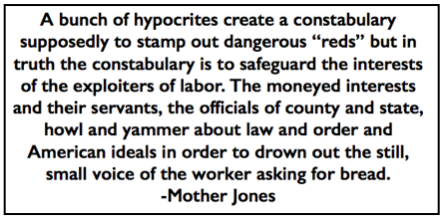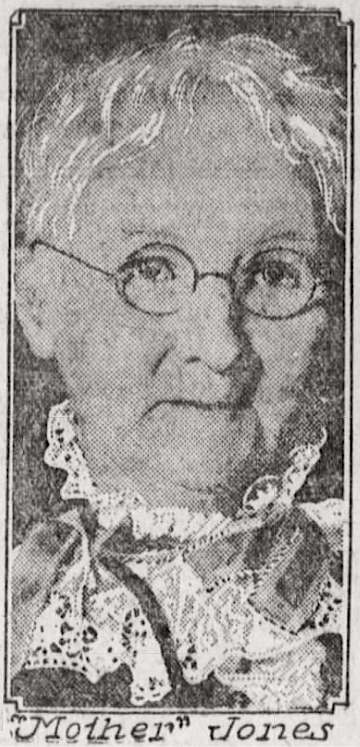 ———-
———-
Hellraisers Journal – Saturday August 16, 1919
Mother Jones News for July 1919, Part II
-Found Protesting Conditions at Sissonville Road Camp
Hell Hole in West Virginia: Sissonville Prison Road Camp
-Described by Mother Jones:
With Mr. [Fred] Mooney and Mr. Snyder, organizers, I went to the prison camp of Kanawha County where prisoners were building a county road. It was a broiling hot day.
About forty men were swinging picks and shovels; some old grey haired men were among them, some extremely young, some diseased, all broken in spirit and body. Some of them, the younger ones, were in chains. They had to drag a heavy iron ball and chain as they walked and worked. A road officer goaded them on if they lagged. He was as pitiless as the Bull on their bent backs.
These were men who had received light sentences in the courts for minor offenses, but the road officer could extend the sentence for the infraction of the tiniest rule. Some men had been in the camp for a year whose sentence had been thirty days for having in their possession a pint of liquor. Another fellow told me he was bringing some whiskey to a sick man. He was arrested, given sixty days and fined $100. Unable to pay he was sentenced to five months in the prison camp, and after suffering hell’s tortures he had attempted to run away. He was caught and given four additional months.
At night the miserable colony were driven to their horrible sleeping quarters. For some, there were iron cages. Iron bunks with only a thin cloth mattress over them. Six prisoners were crowded into these cages. The place was odorous with filth. Vermin crawled about…..
I knew it was useless to tell the governor about conditions as I found them. I knew he would be neither interested nor would he care. It wasn’t election time.
That night I took the train from Charleston and went straight to Washington. In the morning I went to the Department of Justice. I told the Attorney General about conditions in the prison camp of Sissonville . . . . the fetid, disease-breeding cells . . . the swill given the men for food . . . . the brutal treatment. I asked him to make inquiry if there were not federal prisoners there. He promised me he would make immediate inquiry. This he did. To be sure there were no federal prisoners in the gang, but the investigation scared hell out of them, and the day after the federal agents had been there, fifteen prisoners, illegally held, were released.
[Photograph added.]
“A Seething, Burning Hellish Hole”
-Frank W. Snyder
On July 3, 1919, there was published an article in the West Virginia Federationist, official organ of the West Virginia Federation of Labor, written by Editor Frank W. Snyder and entitled: “A Seething, Burning Hellish Hole: The Sissonville Road Prison Camp.” Sadly, we have been unable to lay our hands on said article, but did find it summarize in the Pratt (Kansas) Labor Bulletin of July 25, 1919:
Prison Camp a Disgrace.
Charleston, W. Va.-“For wanton degeneracy depravity and viciousness the Sissonville road prison camp, located 11 miles from the capitol building of the state of West Virginia and the Kanawha county court house, is the most horrible example that ever disgraced a civilized country,” writes Frank W. Snyder editor of the West Virginia Federationist.
These prisoners are working out fines and jail sentences for minor offenses against the peace and dignity of the state.
———-
From The Charleston Mail of July 3, 1919:
Page 5:
GOVERNOR PARDONS 13 PRISONERS OF COUNTY
—–
Action Results From Conditions Existing
at Sissonsville Road Camp
—–Because of the extremely unsanitary conditions existing at the Sissonsville road camp maintained by Kanawha county for county prisoners sentenced to work on the county roads, governor Cornwell issued pardons today to 12 prisoners now being held at the camp…..
Page 6:
CONDITIONS AT ROAD PRISON CAMP ARE BAD
—–
Investigating Committee Finds Intolerable
and Revolting State of Affairs.
—–PARDONS WILL BE SOUGHT
—–
Report on Conditions is Sent to the Governor
-Prison Pen is Far Too Small.
—–Prison conditions at the Sissonsville road prison camp, maintained by the Kanawha county court for prisoners sentenced to work on the county roads, and intolerable and revolting beyond expression, according to statements made by State Pardon Attorney Harry Perkins, Police Judge W. W. Wertz and [Attorney] M. F. Matheney, who made an investigation there Tuesday evening [July 1]…..
The real situation at the camp is expressed in a letter written to a local attorney by M. F. Matheney. The same letter was sent to the governor. The letter is as follows:
Letter is Sent Out.
The County of Kanawha is liable in damages to every prisoner who is confined in the notorious prison road camp on the Sissionsville Road. Young me ar required to sleep with syphilitic patients and with prisoners known to have other contagious diseases. They sleep on iron bars in iron cages, some of them bound in chains. I understand that some of the road guards, road overseers and perhaps the justice of the peace have been in the habit of extending their sentence for sixty or ninety days for trivial violations of the prison rules…..
Fears State Disgrace.
Our state has been brought in the limelight so often that I feel that we have suffered material injury because of the things published against us. I don’t want to resort to the press and to the courts for the purpose of rescuing human being from slow death and starvation in these diseased pest houses, but I do intend to employ such time, money and influence as I have to the rescuing of these unfortunate people, and if necessary I am going to turn the searchlight of publicity on this place. I request that you get up a committee of public spirited men and drive out to the prison camps at the end of the hard road this evening after the prisoners have come in from work at five o’clock and verify these conditions as the actual facts as they exist on the ground are far more deplorable than I have herein set forth.
Very truly yours.
———-
Letter from U.S. Attorney General Palmer to Mother Jones:
Washington, D. C.
July 11, 1919Dear Madam:
I have caused an investigation to be made of the question whether there are any Federal prisoners confined in the Sissonville Road Camp.
I am advised that there are no Federal prisoners there and therefore I do not know of any ground on which the Federal Government could institute an investigation. I suggest that complaint should be made to the Governor of West Virginia if you think the local county authorities are not dealing adequately with conditions.
Yours very truly,
A. Mitchell Palmer
Attorney General
From The Charleston Mail of July 15, 1919
-Condition Improved:
SISSONVILLE ROAD CAMP CONTROVERSY IS DROPPED
—–
Attorney for Complaining Prisoner Withdraws
His Habeas Corpus Petition.
—–In today’s special sitting of the West Virginia supreme court of appeals the contention about conditions at the prisoners’ road camp near Sissonville was finally disposed of by dropping the case of C. C. Thomas, on motion of his attorney….Recently Attorney M. F. Matheney secured a temporary writ of habeas corpus on behalf of the prisoner returnable today. He was present in court with the prisoner, a colored man, accompanied by one of the road camp guards.
Upon the convening of court, Attorney Matheney stated that conditions complained of at the camp have been remedied the interior of the buildings whitewashed, and sanitary surrounding improved. Therefore he asked that the petition be dismissed…The prisoner, who has been in the city jail since his application, was returned to camp today….
Note: Emphasis added throughout.
~~~~~~~~~~~~~~~~~~~~~~
SOURCES
The Autobiography of Mother Jones
Charles Kerr, Chicago, 1925
-Chapter 23: A West Virginia Prison Camp
https://www.iww.org/history/library/MotherJones/autobiography/23
https://www.marxists.org/subject/women/authors/jones/ch23.htm
https://libcom.org/library/chapter-23-west-virginia-prison-camp
Note: I have been unable to locate Mother at Sissonville thru news accounts of the day; more research needed. Snyder’s article might help with that, but not yet available online.
Note: I think it’s a safe bet that “Mr. Mooney” was Fred Mooney, Secretary-Treasurer of UMWA District 17. Mother was, at that time (1918/1919), working closely with Mooney organizing in WV-see Mooney below: Chapter V-page 58.
Mother Jones
The Most Dangerous Woman in America
-by Elliott J. Gorn
Farrar, Straus and Giroux, Jun 2, 2015
-pages 251-2; 373, note 59
https://books.google.com/books?id=9gRpCAAAQBAJ
Labor Bulletin
(Pratt, Kansas)
-July 25, 1919
https://www.newspapers.com/image/481899710/
The Charleston Mail
(Charleston, West Virginia)
-July 3, 1919
https://www.newspapers.com/image/38762963/
https://www.newspapers.com/image/38762964
-July 15, 1919
https://www.newspapers.com/image/38763115/
The Correspondence of Mother Jones
-ed by Edward M. Steel
University of Pittsburgh Press, 1985
page 194
https://books.google.com/books?id=EZ2xAAAAIAA
https://digital.library.pitt.edu/islandora/object/pitt%3A31735057897435/from_search/12cd783b710390bfc729a898f7f8fc9b-0#page/1/mode/2up
IMAGE
Mother Jones Women in Industry, Eve Ns Hburg PA p2, Jan 6, 1919
https://www.newspapers.com/image/57884211
See also:
Hellraisers Journal – Friday August 15, 1919
Mother Jones News for July 1919, Part I
-“We have got to march on with the great army of the world…”
Mother Jones
The Miners’ Angel
-by Dale Fetherling
So IL U Press, 1974
-below looks to be 2010 edition, I have 1974
Pages 179; 247, notes 4 & 5
Note: this book is available for preview online
-sadly misidentified as:
Mrs. Abraham Lincoln: A Study of Her Personality and Her Influence
-by W. A. Evans, 2010
(search: sissonville)
https://books.google.com/books?id=Sf7uyRYxePIC&printsec=frontcover&dq=isbn:0809329719&hl=en&sa=X&ved=2ahUKEwjt5OO5jfbjAhUQLa0KHUtUCHMQ6AEwAHoECAAQAg#v=onepage&q&f=false
Struggle in the Coal Fields
-Autobiography of Fred Mooney
Secretary-Treasurer, District 17
United Mine Workers of America
-ed by J. W. Hess
WV U Library, 1967
(see Chapter V, pages 58)
Note: Sissonville not mentioned in Mooney’s book.
https://books.google.com/books?id=nE3tAAAAMAAJ
Mooney on organizing with Mother Jones: “Potatoes, hell!”
[After a long, hard and successful day of organizing] we returned to headquarters at Fairmont, we were worn out and hungry. The Watson Restaurant was a very good place to dine. We entered the restaurant and found a vacant table. “What are you going to eat, Mooney?” Mother asked.
“Don’t know yet Mother,” I said, “but I believe I will have some of those French fried potatoes, for one thing.”
“Potatoes, hell,” she exploded, “order you one of those T-Bone steaks, you have earned it.”
I, like many other officers, was skeptical about ordering food when Mother was around for she occasionally gave the officers “hell” as she termed it, “for filling their stomachs with beefsteak at the expense of the wretches.” Each of us put forth every effort to avoid Mother’s ire….
[Emphasis added.]
~~~~~~~~~~~~~~~~~~~~~~~~~~~~~~~~~~~~~~~~~~~~~
The Autobiography of Mother Jones
Chapter 23: “In a West Virginia Prison Camp”
The Battle Cry of Freedom – The Weavers

